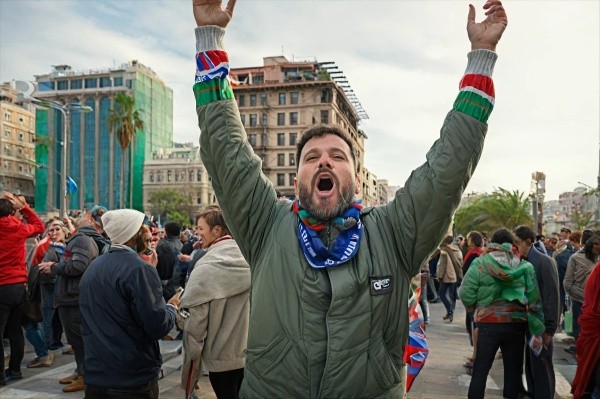Iran’s Plan to Strike Back Against the U.S.
Iran’s Military Preparations Following U.S. Attacks
Loading...

Opposition forces have taken control of the capital after a significant offensive. Here is how it unravelled.
A Sudden Turn of Events
In a dramatic turn of events early on Sunday morning, opposition forces declared the liberation of Syria from President Bashar al-Assad's regime as they surged into the capital, Damascus. Reports indicate that al-Assad fled the city, with his current whereabouts unknown, marking a significant moment in the history of a nation that has endured over 53 years of al-Assad family rule. This upheaval comes nearly 14 years after peaceful protests against the government escalated into a brutal civil war, leading to widespread devastation and loss of life.
The Offensive Begins
The rapid collapse of al-Assad's regime can be traced back to November 27, when a coalition of opposition fighters launched a major offensive dubbed **Operation Deterrence of Aggression**. This operation was spearheaded by Hayat Tahrir al-Sham (HTS), a prominent opposition group, and supported by various Turkish-backed factions. The offensive began at the front lines between the opposition-held Idlib and the neighboring Aleppo governorate. Within just three days, the opposition captured Aleppo, Syria's second-largest city, signaling a significant shift in the balance of power.
Who Were the Key Players?
HTS, led by Abu Mohammed al-Julani, emerged as the most organized faction in this offensive, having previously governed Idlib for years. Other groups involved included the National Front for Liberation, Ahrar al-Sham, Jaish al-Izza, and the Nour al-Din al-Zenki Movement, all of which fall under the umbrella of the Syrian National Army. Despite the rapid advances, key coastal governorates like Lattakia and Tartous, known as al-Assad strongholds, remained under regime control.
The Unraveling of Government Control
The opposition's swift progress continued as they captured Hama and Homs, cities that had been pivotal during the early years of the uprising. On Saturday, Deraa, the birthplace of the 2011 protests, also fell from government control. The Syrian army announced a "redeployment" in the region, but this appeared ineffective as troops began withdrawing from strategic positions, including Quneitra near the Israeli-annexed Golan Heights.
Factors Behind al-Assad's Downfall
Several factors contributed to the rapid decline of al-Assad's regime. The Syrian economy has been in freefall, largely sustained by illicit trade in the psychoactive drug Captagon. As living conditions worsened, al-Assad's popularity plummeted, leading to widespread discontent among soldiers and police officers, many of whom abandoned their posts. The regime's military reliance on Russian and Iranian support has also been a critical weakness, especially as Russia remains preoccupied with its invasion of Ukraine and Iran faces challenges from Israeli attacks.
The Current Situation of al-Assad
As of now, the exact location of Bashar al-Assad remains a mystery. Reports suggest he may have fled to Moscow, with communication lost between him and his Defense Minister, Ali Abbas. Meanwhile, Prime Minister Mohammad Ghazi al-Jalali has remained in Syria, asserting his commitment to maintaining government functions.
Public Reaction and Celebrations
The announcement of al-Assad's departure sparked jubilant celebrations across Syrian cities, including Damascus and Homs. Crowds gathered to express their joy, with images capturing opposition fighters firing into the air and citizens climbing atop tanks. Statues of al-Assad's father, Hafez, were toppled, and public prayers were held in celebration of what many viewed as the end of tyranny.
The Fate of Detainees
In a significant development, opposition forces opened regime prisons during their advance, liberating many political prisoners. HTS announced the storming of Sednaya prison, notorious for its human rights abuses, declaring an end to the era of oppression.
Looking Ahead
The future of Syria remains uncertain. Analysts warn of potential pitfalls if various factions do not cooperate. Prime Minister al-Jalali has expressed a willingness to work with the opposition to establish a transitional government, emphasizing the need for a unified approach to rebuild the nation. HTS leader al-Julani echoed this sentiment, stating that public institutions would remain under the prime minister's supervision until an official transfer of power occurs. The coming days will be crucial in determining the path forward for a country long ravaged by conflict.
Editor
Iran’s Military Preparations Following U.S. Attacks
Troops remain in five strategic locations, raising fears of renewed tensions and long-term occupation.
Opposition forces declare Syria free of Assad rule as the president reportedly flees the country.
